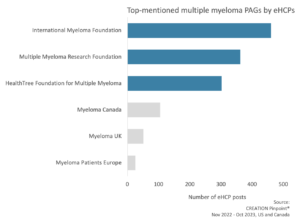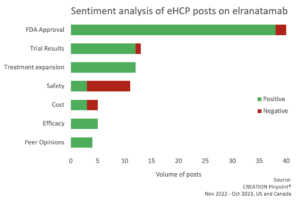19.12.2023 | Insight
Multiple Myeloma: eHCPs in the US and Canada advocate for a patient-centric approach
CREATION.co retrospectively analysed nearly 13K posts by 1,186 eHCPs in the US and Canada from 01 November 2022 to 31 October 2023. Key takeaways included:
- eHCPs advocate for equitable healthcare access in ethnic minorities.
- Patient preferences, safety and affordability were key for eHCPs deciding treatment.
- eHCPs engaged with Patient Advocacy Groups (PAGs) to advocate for better patient care.
- eHCPs considered patient factors such as refractory status and transplant eligibility when sequencing treatment.
Online healthcare professionals (eHCPs) in the US and Canada adopted a heavily patient-centric approach when discussing treatments and trials in the multiple myeloma space. They advocated for patient well-being, safety and equitable healthcare access. They tailored treatment to accommodate patient preferences, affordability and prognostic factors.
eHCPs highlighted healthcare disparities for black and Hispanic patients
16% of discussions among eHCPs related to multiple myeloma focused on racial disparities. eHCPs delved into the underlying reasons and proposed solutions to ensure equitable healthcare access.

eHCPs discussed unequal healthcare access and poor trial representation of black patients
Nearly half of these discussions centred around challenges faced by the black community. eHCPs brought attention to the fact that African Americans had half the survival rate and worse treatment outcomes than white Americans, which was symptomatic of systemic problems and healthcare inequality as opposed to biological differences.
Myeloma ACTION Month-Survival outcomes in AFRICAN AMERICANS are half of what is seen in WHITE AMERICANS. When barriers to early dx and Rx are removed, AA #myeloma pts do just as well. #MYELOMASTORY #mmsm #myeloma @IMFmyeloma @IMFsupport pic.twitter.com/HsPMNHQWyS
— John DeFlice (@johnde1MYELOMA) March 19, 2023
eHCPs emphasised the underrepresentation of black people in trials, citing examples such as the KarMMA-3 trial with only 9% representation and the ide-cel trial with 7%. eHCP Samer Al Hadidi, a haematologist-oncologist in Arkansas, expressed that the ‘field continues to fail minority patients’ in this regard, and attributed the underrepresentation of black participants to the lack of trial locations in areas with higher proportions of the black community.
Landscape of clinical trials of bispecifics and CAR-T in myeloma is distributed heavily in areas where black pts don’t live
Many trials are in the same institutions and this didn’t reflect the volume of pts treated for myeloma as we previously reported https://t.co/lBP2vdoHZ1 pic.twitter.com/XRZjHFoJlS
— Samer Al Hadidi, MD,MS,FACP (@HadidiSamer) February 12, 2023
eHCP Tanya Wildes noted that ‘the word “trial” was potentially stigmatizing for black people with myeloma’. To increase awareness of multiple myeloma within the black community, Rahul Banerjee, a haematologist-oncologist in Washington, shared webinars. Additionally, haematologist Joseph Mikhael improved public awareness by posting polls that shed light on the trial and healthcare disparity experiences of African Americans. Moreover, eHCPs like oncologist Saad Usmani reposted details of a funded scholars program for black researchers to improve black representation in multiple myeloma research.
16/ In #myeloma #ClinicalTrials…
💡Screening for trial eligibility was substantially lower across all racial and ethnic minority subgroups compared to White pts
💡24% of Black pts screened are ineligible
💡20% of Hispanic or Latino pts screened are ineligible#mmsm pic.twitter.com/jARDNifKAm— Joseph Mikhael (@jmikhaelmd) September 27, 2023
eHCPs attributed worse outcomes in Hispanic patients to systemic and financial barriers
Of the 216 posts related to racial disparity, 13% focused on Hispanic patients, with some eHCPs reposting research conducted by Dr Hadidi on the healthcare challenges faced by Hispanic patients.
Check out our new publication led by the super ⭐️@AndreaAnampaG and @inas_md @Sarasinh titled Health Disparities Experienced by Hispanic Americans with Multiple Myeloma: A Systematic Review #mmsm
➡️ Summary tables of reported studies, free access👇
➡️ https://t.co/h3emo0XilZ pic.twitter.com/yKkcKRsHVl
— Samer Al Hadidi, MD,MS,FACP (@HadidiSamer) December 31, 2022
Dr Hadidi claimed that 59% of studies reported worse outcomes in Hispanic patients, and noted that they had a higher inpatient mortality rate than other ethnic minorities.
Of 22 studies that were evaluated, 59% reported worse outcomes for Hispanic patients with multiple myeloma compared with those of other ethnic groups. #mmsm | @HadidiSamer https://t.co/azjSMMFR3i
— CancerNetwork® (@CancerNetwrk) May 17, 2023
In his research, Dr Hadidi attributed their worse outcomes to a generally lower socioeconomic status and lack of health insurance among Hispanic communities, discriminatory laws, financial barriers and late adoption of novel therapies among Hispanic patients when compared to non-Hispanic Whites. He advocated for national-level structural reforms to combat these issues.
Further emphasised in his research was the meagre 1.3% participation of Hispanics in trials. Hence, he stressed the pivotal role of patient education in improving this number. Highlighting an interesting trend, Dr Hadidi pointed out that minority patients tend to prefer physicians from their own ethnic backgrounds and that Hispanic physicians represent just 5.8% of the medical workforce. To address this disparity, he proposed diversification of the workforce to increase this number and encourage more minority patients to seek treatment.
eHCPs also shared research conducted by David Gómez-Almaguer on the challenges and health disparities faced by Hispanic patients in the Latin America (LATAM) region, indicating that their advocacy for equitable healthcare access in the Hispanic community extended beyond North America.
Multiple myeloma in Latin America is complicated by the lack of resources and access to new diagnostic tools and sophisticated treatments. More efforts are needed in our region. pic.twitter.com/0PL7mBTjVr
— David Gómez-Almaguer (@dgomezalmaguer) January 5, 2023
eHCPs noted high trial ineligibility rates among ethnic minorities
40% of racial disparity posts focused on ethnic minorities in general. Mainly discussed were their high trial ineligibility rates, with DOL Joseph Mikhael highlighting a 24% rate for black people and 20% for Latinos.
16/ In #myeloma #ClinicalTrials…
💡Screening for trial eligibility was substantially lower across all racial and ethnic minority subgroups compared to White pts
💡24% of Black pts screened are ineligible
💡20% of Hispanic or Latino pts screened are ineligible#mmsm pic.twitter.com/jARDNifKAm— Joseph Mikhael (@jmikhaelmd) September 27, 2023
eHCPs also shared research on racial disparities in multiple myeloma presented at the ASCO 2023 congress.
#ASCO23 #mmsm @ASCO
Education session- Embracing Myeloma CAR-T@SurbhiSidanaMDRacial and Ethnic Disparities in Acess pic.twitter.com/fg2wmUeQtC
— Samer Al Hadidi, MD,MS,FACP (@HadidiSamer) June 4, 2023
eHCPs advocate for better patient support in multiple myeloma
The perceived mistrust of HCPs among older black patients was raised as a possible barrier to healthcare access and clinical trial participation.
#mistrust is a major barrier to healthcare access incl. clinical trials for #Black #older adults with #mmsm. In this video by @MyelomaTeacher @HealthTreeMM we discuss some strategies we used to help engage #patients & #caregivers during interviews around topics of #trust & access
— Dr. Shakira J Grant MBBS, MSCR (@ShakiraG_MBBS) February 4, 2023
To address this, eHCPs reshared content by patient advocacy groups International Myeloma Foundation and HealthTree Foundation for Multiple Myeloma on strategies to dissolve patient mistrust and advocate for patients. eHCPs also reposted European PAGS like Myeloma UK that praised compassionate care from an NHS team of haematologists.

eHCPs’ treatment decisions are guided by patient factors and wellbeing
Teresa Miceli, among other eHCPs, advocated for patient-centred care prioritising patient preferences and quality of life, especially for the frail.
PRO’s is a reminder, we are not treating #myeloma we are treating PEOPLE with #myeloma #QOL measurement & pt input is needed for all studies. #ASH22 @IMFMyeloma #IMFASH22 #mmsm https://t.co/XpMqUu1TSk
— Teresa Miceli. ❤️&☮️4🌎 (@IMFnurseMyeloma) December 11, 2022
eHCP Sridevi Rajeeve, among others, highlighted the use of a tailored approach to treatment sequencing based on the prognostic factors specific to each patient, rather than adopting a pre-specified treatment regimen for all patients.
CONGRESS | #EHA2023 | Cyrille Touzeau @CHUnantes presents a decision tree to aid sequencing decisions in MM. Transplant eligibility and refractory status are highlighted as a key prognostic factors to determine sequencing pathways. #mmsm #myeloma pic.twitter.com/5IyLwh567S
— Multiple Myeloma Hub (@MM_Hub) June 9, 2023
Two eHCPs considered patient comfort, preferring hospitalisation for specialised care but outpatient care for lower costs and greater patient happiness.
8/ @Radhika_Bansl @YiLinMDPhD outpatient teclistamab in #MMsm using day hospital and RPM #cellphonesandcelltherapies
98% of 155 tec doses safely given as outpt 🤯
⬇️ costs of care, ⬇️ monster 10-day LOS, happier patients (no 🛌 better than one's own!)https://t.co/EVcV5XbseC pic.twitter.com/VzHDVM0eBs
— Rahul Banerjee, MD, FACP (@RahulBanerjeeMD) June 7, 2023
When deciding treatment, eHCPs predominantly considered FDA approval, trial results demonstrating drug efficacy and safety in patients, and if the drug was a valuable alternative for patients.

For instance, eHCPs celebrated the accelerated FDA approval of elranatamab, its efficacy for heavily pretreated patients and bi-weekly dosing schedule which meant reduced costs.
How to choose between the 2 new BCMA directed bispecifics in myeloma?
Erlantamab is eventually given every 2 weeks as opposed to teclistamab every week for ever.
They will never be compared in RCT and both cost a huge amount of money this is all I have.
So I use erlantamab.
— Aaron Goodman – “Papa Heme” (@AaronGoodman33) August 16, 2023
However, of the negative elranatamab posts, 75% raised concerns about the high risk of infections, 44% fatality and 50% dropout rate due to severe adverse events – in a trial combining elranatamab with daratumumab.
#mmsm we need to avoid such reporting 👇
🛑44% of enrolled pts died due to treatment emergent adverse events (TEAE)
🛑~50% of pts discontinued ttt related to AEs
Conclusion:
➡️ Elranatamab+Dara was well tolerated!!
➡️No new safety signal due to combination!! pic.twitter.com/47GXJgPScJ— Samer Al Hadidi, MD,MS,FACP (@HadidiSamer) February 22, 2023
eHCPs discussed the risk of infection in trials and drug administration modes in the interest of patient safety, with some preferring intravenous delivery of bispecific antibodies for lower infection risk, and others choosing subcutaneous delivery for better clinical efficacy.
Intravenous immunoglobulin could potentially reduce “most of the infection risk” in patients with multiple myeloma who are receiving BCMA-targeted bispecific antibodies, according to a study led by Guido Lancman, MD of the @PMResearch_UHN.
Read more: https://t.co/qWfRHtfgSp pic.twitter.com/SPsWgwD9E3
— Blood Cancers Today (@Blood_Cancers) October 18, 2023
Research shows patient-centric approach
eHCPs in Canada and the US advocate for a patient-centred approach to multiple myeloma treatment and equitable healthcare for their patients.
In our analysis we saw them sharing research on the causes of underrepresentation and treatment access in black and Hispanic communities as well as suggesting remedial measures:
- Engaging with local and European PAGs to spread awareness about multiple myeloma in these minorities and to dissolve patient mistrust of HCPs.
- Encouraging peers to remember that they were treating people and not a condition, hence the need to prioritise patient well-being, individual prognostic factors and quality of life in all treatment decisions.
- Bringing clarity on the pros and cons of treatment location and regimens, and the importance of considering patient affordability, safety, side-effects and comfort.
Genuine concern for patients and a need for equitable access to healthcare among races shaped eHCP conversations in the multiple myeloma space, with influential eHCPs known as Digital Opinion Leaders acting as significant drivers of these conversations among peers.
To discuss these findings in more detail or understand the needs and views of HCPs in your markets and therapy area, let us know, we’d love to chat.
 By Eden Daniel
By Eden Daniel 


